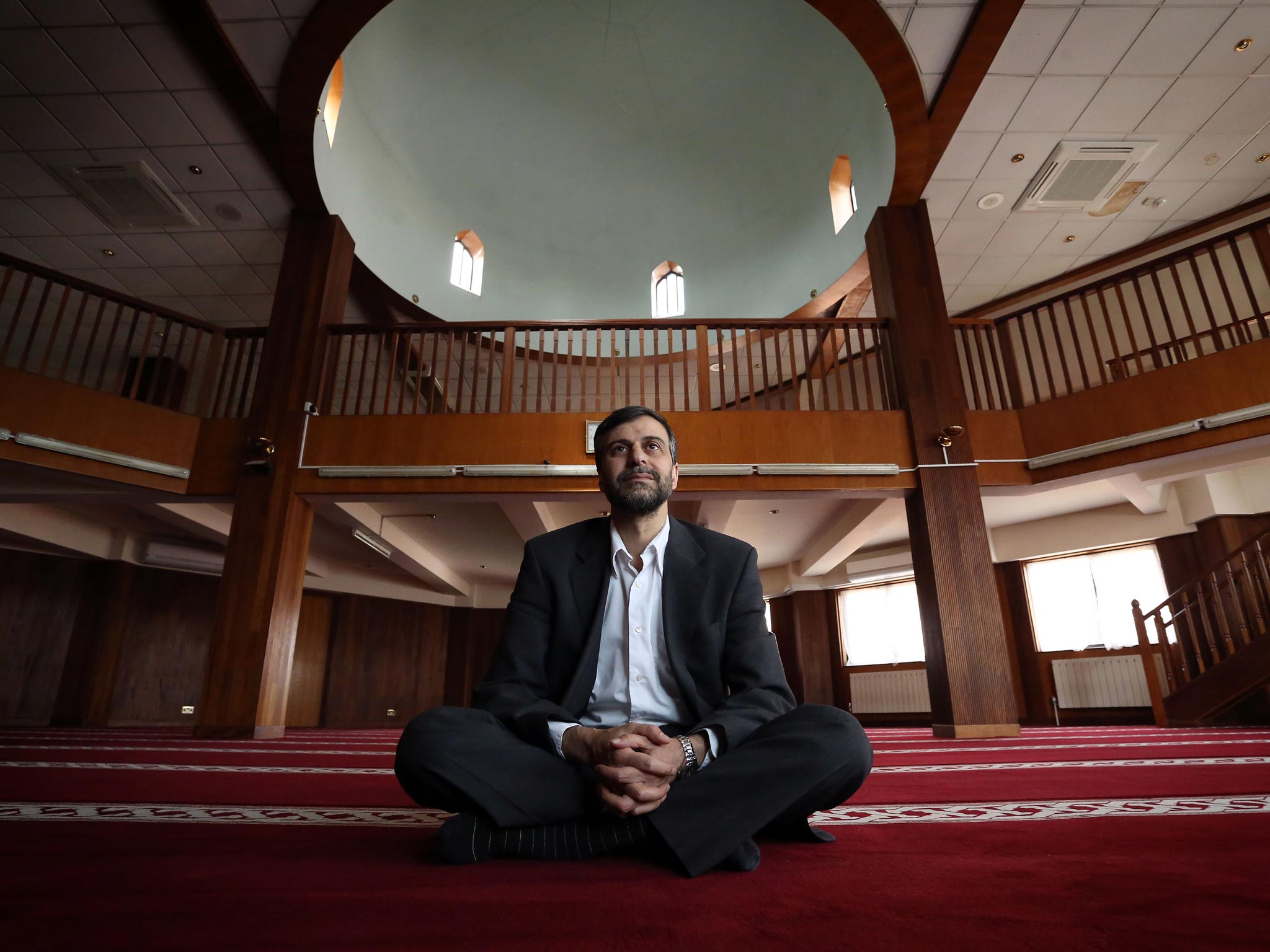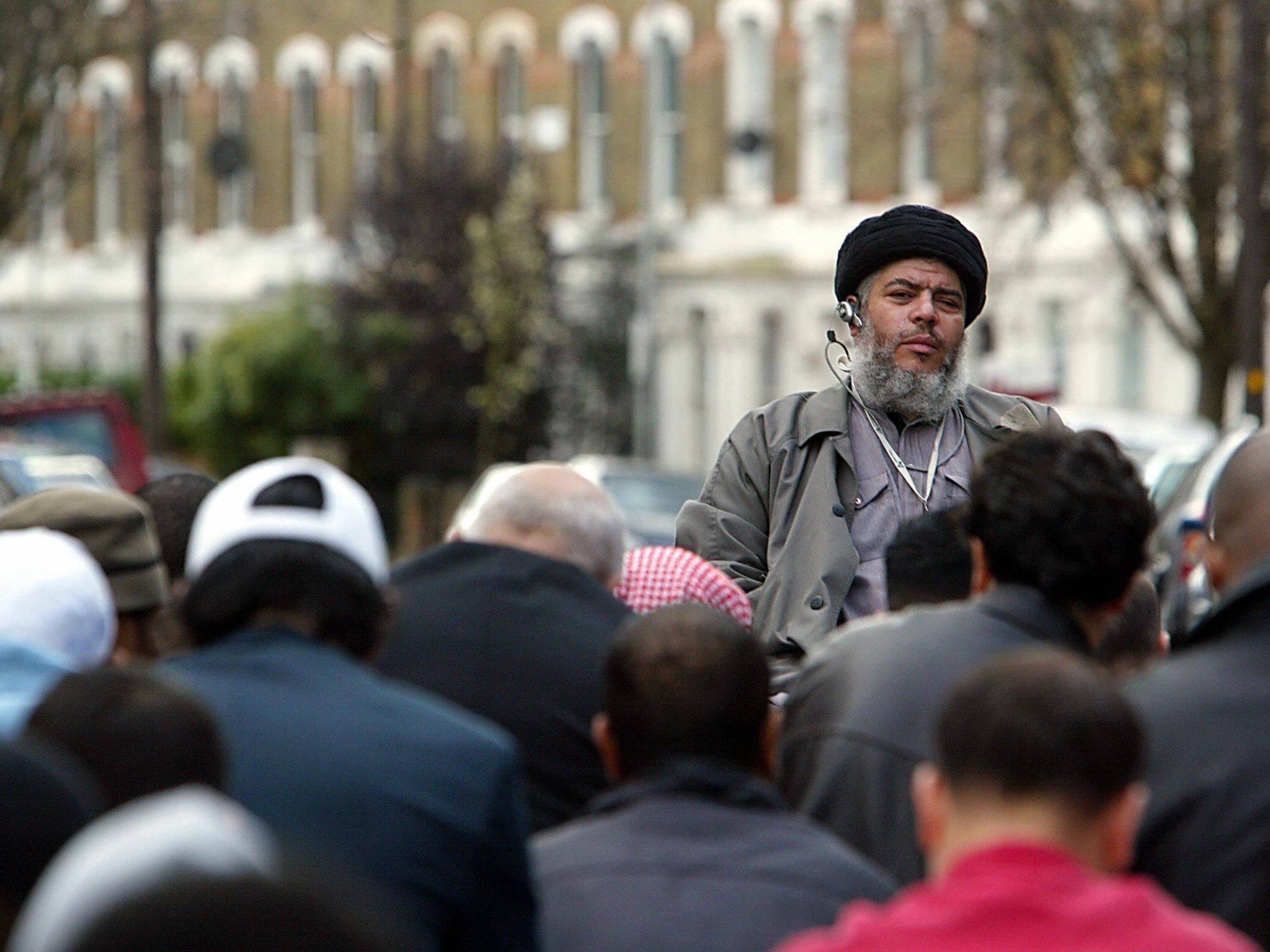Finsbury Park Mosque: Emerging from the shadow of Abu Hamza
As the radical cleric begins a life sentence for supporting terrorism, Charlotte Philby visits Finsbury Park mosque, where he once preached

Built in red brick and set back from the road on a backstreet in residential north London, outwardly Finsbury Park mosque is unremarkable. Yet Abu Hamza’s imprisonment in the US this week has once again thrust its name into the headlines, damned as the place where the radical cleric ran “an al-Qa’ida camp in the heart of London”, according to one M15 informer, while holding regular sermons outside on St Thomas’ Road.
Even thousands of miles across the Atlantic, the name Finsbury Park remains infamous and inextricably linked with the former imam, as well as the self-styled sheik Abu Hamza al-Masri and the legions of young men – including “shoe-bomber” Richard Reid and 7/7 bomber Germaine Lindsay – who came here to be primed for martyrdom.
It is nine years since the building was taken over and its extremist parts dismantled from within, and it now serves as a community centre as much as a mosque, holding regular inter-faith meetings to discuss local concerns on disability, mental health and the environment.
The surrounding area, a scruffy transport hub with lively cafés, has worked at reforming its reputation too. In 2005 – the same year Hamza was imprisoned for seven years in Britain – £5m of lottery funds were awarded to transform the 46 hectares of public parkland that stands north-east of its bus station.
The mosque, however, remains the most famous landmark.
Inside the main entrance are leaflets for local events and an expedition to the Great Wall of China, standing alongside a box labelled “fatwa suggestions” – a phrase that might worry people who immediately connect the term with Iran’s death order on Salman Rushdie, but in fact here refers to unthreatening lifestyle and spiritual opinions on Islamic rules. The mosque’s office wall proudly bears an award from Islington council for services to the community.

“Before we took over in February 2005,” says Mohammed Kozbar, chairman of trustees at Finsbury Park mosque, “only a few people used to come and pray here. Maybe people didn’t feel comfortable because of the issues at that time.” On Friday, 2,000 worshippers filled the large prayer rooms spread over two storeys.
The 47-year-old Mr Kozbar is welcoming – offering me sweets and orange juice as we talk – but understandably a little wary in dealing with the press. He is clearly focused on communicating the mosque’s efforts to reform itself and its public image.
Prior to 2005, Mr Kozbar says, “tensions were very high between the community here. Let’s say there was an air of hostility more than anything else. The media were coming here all the time, police presence, far-right extremists used to protest outside the mosque for different reasons.”
He says there was a sense of mistrust and misunderstanding, within the Muslim faith and from outside. “What was happening here was not healthy for the Muslim community, for the local community, or for the country.”
Of the many challenges they faced when they started, he believes “most have been met”. But there is, he says, still some way to go.
“We still receive some hate messages. One day there was a pig’s head placed outside the entrance, we received an envelope with white powder inside... we’ve had some attempts to drop fire-bombs here at the mosque.”
But one regular worshipper, who works in a nearby shop and does not want to be named, disputes that the problem here was ever as bad as perceived. “I’ve been praying here nearly 13 or 14 years. Since even before when Abu Hamzu was here, there were no problems,” he says.
“Before, maybe people didn’t come to this mosque – I can’t say for people why they didn’t come. But now people attend, they’ve fixed everything from inside, everything is like new.”
Ensuring young worshippers cannot become potential recruits to a jihadist agenda, Mr Kozbar advocates working with youth groups, counteracting the kind of ostracising that helps breed hatred.
“We take [young people] away from the street, from gangs, from drugs and from extremism, as well as creating an atmosphere where they can debate and play table tennis and snooker in a relaxed atmosphere.”
In terms of its internal cleansing, Mr Kozbar believes Finsbury Park has made good progress – but in order to finally escape the shadow of Hamza, which still looms large over this community, he says outside perceptions have to change too.
If Hamza’s legacy, which lies as much in the divisions he created and the fear he instilled between neighbours, is to be broken, there must be a shift of focus, away from the abhorrent actions of a tiny minority and towards the efforts of the wider population. Only then, Mr Kozbar suggests, will the fracture lines truly begin to heal.
“We feel a strong sense of responsibility. We think we should be role models to other mosques and other faith places, to deal with extremism and any other problems... But we [as Muslims] want to feel we are part of the wider community. We want to be British citizens, not second-class citizens, and we want to feel we have duties, responsibilities and rights as well.”
Join our commenting forum
Join thought-provoking conversations, follow other Independent readers and see their replies
Comments